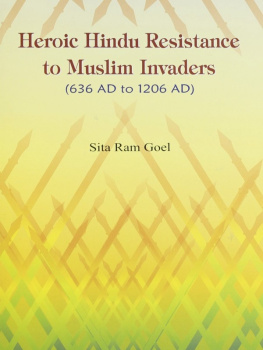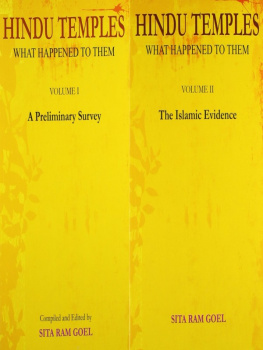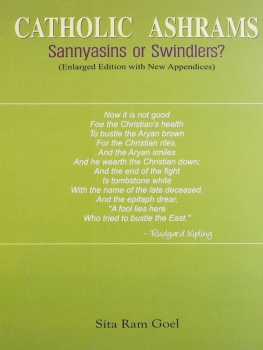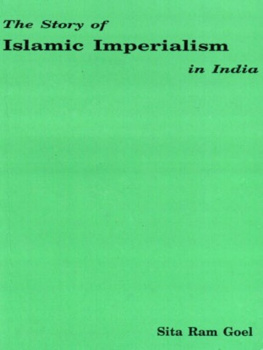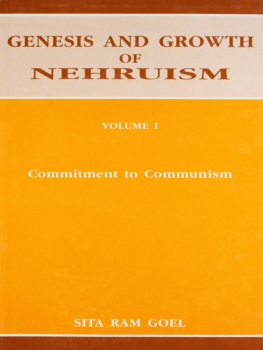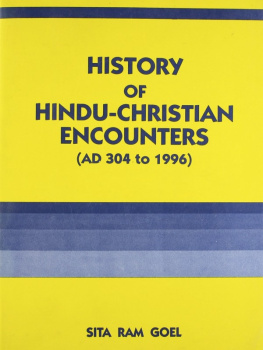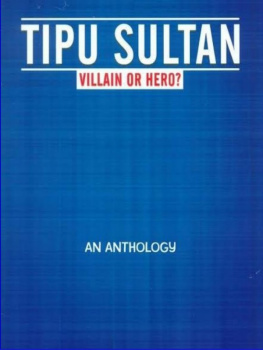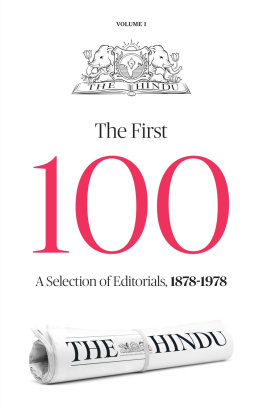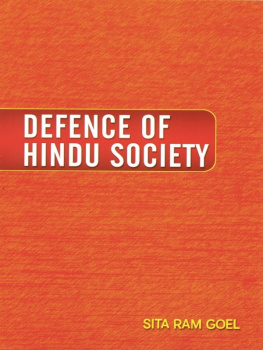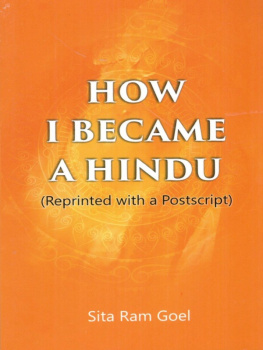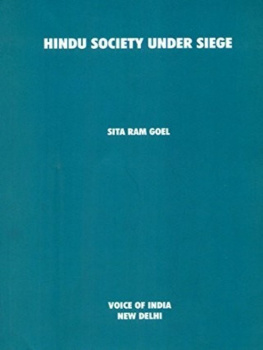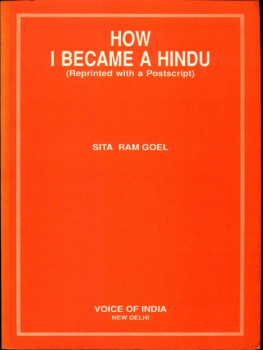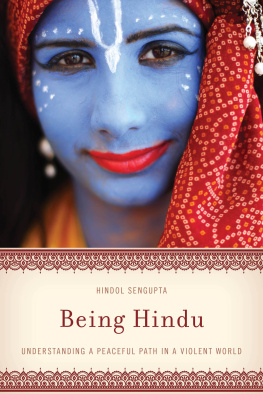1. NATIONAL PERSPECTIVE ON INDIAN HISTORY
Mathew Arnold had composed his famous lines with reference to a particular context. He had the Buddha and similar Hindu sages in mind when he wrote the following famous lines:
The East bowed low before the blast,
In patient deep disdain;
She let the legions thunder past,
And plunged in thought again.
Little did the poet suspect that his tribute to Hindu spirituality would be twisted to embellish an imperialist version of Indian history according to which the meek Hindu had always been preoccupied with sterile speculations, and seldom stood up in defence of his country and culture.
PERVERSE VERSION OF INDIAN HISTORY
This version of Indian history was formulated by a few misinformed or motivated British historians. But many Hindus participated in popularising this version in the mistaken belief that they were thus proving the superiority of Indias spiritual culture over the materialistic civilization of the modern West. In due course, this became the standard lore taught in our schools and colleges under the system of education sponsored by Christian missionaries and British bureaucrats. The same system of education has not only continued after independence but has also multiplied manifold. It has spread this version of Indian history to larger and larger segments of succeeding generations. Muslim and Marxist historians have promoted it with an ever increasing zeal. They may not have any use for Hindu spirituality. But they find this version of Indian history very convenient for advancing their imperialist causes.
In the process, Indias history has become a history of foreign invaders - Aryans, Iranians, Greeks, Parthians, Scythians, Kushans, Arabs, Turks, Persians, Portuguese, Dutch, French, and British - rather than a history of the greatest civilization which the world has known, and later on of Hindu heroism which fought and ultimately frustrated all foreign invaders. India itself has become a sub-continent seething with a mass of heterogeneous humanity rather than an ancient and indivisible Hindu homeland. Indian people have become a conglomeration of nationalities, racial groups and religious communities which are finding it difficult to co-exist in peace, rather than a national society which is trying to reform itself and reclaim some of its unfortunate sections alienated from it by successive waves of Islamic, Christian and modern Western imperialism. And Indian culture has become a mechanical mixture of odds and ends, indigenous and imported, rather than a homogeneous whole created by a vast spiritual vision which is finding itself ill at ease with incompatible impositions.
It was this version of Indias history which gave a good conscience to the British imperialist while he pulverised Hindu society, plundered Hindu wealth and poured undisguised contempt on Hindu culture. It was this version of Indias history which emasculated Hindu society and emboldened the residues of Islamic imperialism to stage street riots and then walk away with precious parts of the Hindu homeland, thus consolidating an aggression which had not succeeded even though mounted again and again for more than a thousand years. It is this version of Indias history which is being invoked by the fifth-columns of Islam, Christianity, and Communism, each of which looks forward to a final conquest of this country with the help of foreign finances and, if need be, foreign firearms. And it is this version of Indias history which is being promoted by power-hungry politicians who woo the Muslim vote-bank while they divide Hindu society into mutually hostile camps.
PUTTING THE RECORD STRAIGHT
Hindu society owes it to its own survival in the present and to the prosperity of its future generations to repudiate this perverse version of Indias history, and to put the record straight so that no one dares divorce Hindu spirituality from Hindu heroism, Hindu nation from the Hindu homeland, and Hindu culture from the national culture of India. Hindu saints, sages and scholars in general and Hindu historians in particular have to come forward to do their duty towards their society and culture and to pay homage to their ancient heritage. Hindu Dharmashstras have enjoined upon every Hindu to repay according to his or her capacity the rishi-riNa, that is, the debt we owe to our seers and sages, by passing on to the next generation the Veda and the Itihsa-PurNa, that is, the spiritual and cultural vision of Sanatana Dharma and the historical tradition of Hindu heroism. In the present situation, that is perhaps also the best way to repay the pitri-riNa, that is, the debt we owe to our forefathers for the protection, preservation and perpetuation of our great Hindu society and its continuously creative culture.
The book is small in size. But it is packed with painstaking research, and is thus a solid and substantial contribution to the history of a comparatively obscure period of Indian history. What is more important is the perspective. The present thesis, writes Dr. Misra in his Preface, is an attempt to provide a connected account of the prolonged and sustained efforts made by Indians to stem the tide of early Muslim invaders. The political and military resistance was spread over more than five and half centuries till its final collapse in northern India in the last decade of the 12th Century A.D. For long, historians have emphasised merely the ultimate collapse of the Indians, ignoring completely the resistance offered by them. It is a fact of history that such sustained resistance as encountered by the Muslim arms in India was not faced by them in any other land conquered by them The Indian resistance had another facet, which was the outcome of the resolute determination of the Indians to preserve their religious and cultural identity.
THE NATIONAL PERSPECTIVE
Dr. Misras monograph deals with a specific period limited in its time-span. But the perspective he provides in processing this period is pertinent to the entire panorama of Indian history. For long, India has been depicted as a no-mans-land which invader after invader has claimed as an easy prize, and into which diverse races, religions, and cultures have acquired an equal legitimacy. Dr. Misra rejects this perspective effectively and forcefully when he portrays India as the homeland of an ancient people who are united by a distinct and deeply spiritual culture, and who are prepared to fight and defy death in defence of their patrimony. The national perspective that thus emerges from Dr. Misras monograph is relevant not only to a correct reading of Indias past but also to a correct appraisal of Indias present-day politics.
This national perspective on Indias history had been alive and active in our national consciousness all through the long-drawn-out struggle against Islamic imperialism, though it had expressed itself more as a religious and cultural idiom than as a political ideology. It had come into sharp focus in course of the Swadeshi Movement (1905-09) when the brave resistance offered by the Rajputs and the turning of tables by the Marathas and the Sikhs, had become a backdrop for the freedom fight being waged against British imperialism. The residues of Islamic imperialism like the Aligarh school of Muslim politicians had taken fright at this re-affirmation of the national perspective, and sought protection from the British against the rising tide of Indian nationalism.
POLITICS PERVERTS HISTORY
It was only later on that the national perspective was frowned upon by a political leadership which was out to seek Muslim support for the national movement as a short-cut to a quick and peaceful transfer of power. The Muslim support failed to materialise. Instead, Islamic imperialism became parasitic on the national movement, and continued to fatten till it succeeded in partitioning the country. But in the process, the national perspective on Indian history stood subverted in all its essentials. We are now paying the price in the from of renewed aggression from Islamic imperialism, and the growing fissiparous tendencies within the national fold.

